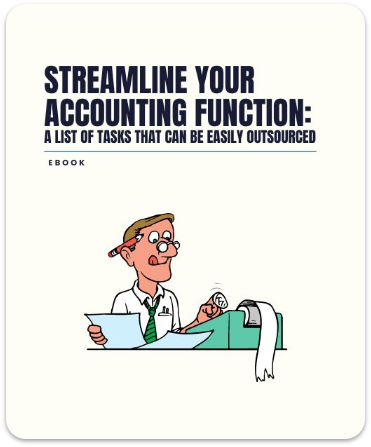Strategies for overcoming common challenges accounting firms face
Introduction:
According to a report by Research And Markets, the global accounting services market is predicted to reach $735.94 billion in 2025 at a compound annual growth rate (CAGR) of 6%. This growth is expected to be driven by the increasing demand for accounting services in various healthcare, IT, and financial sectors.
However, with growth comes challenges. As an accounting firm grows, it faces various common challenges that can hinder its success. This blog will discuss some of these challenges and strategies firms can implement to overcome them.
Key takeaways
Addressing the skill shortage in accounting requires strategic recruitment and development to meet industry demands.
Keeping up with rapidly evolving technology and software is a major challenge for accounting firms.
Regulatory changes in tax laws and financial regulations require firms to invest in continuous education and compliance management.
Implementing comprehensive cybersecurity measures is essential to protect sensitive client data.
Common challenges accounting firms face
Here are the major hurdles accounting firms face today, along with steps you can implement to transform challenges into opportunities.
Skill shortage
The Australian accounting industry faces a critical skill shortage, with projections indicating the need for 338,362 accountants by 2026, translating to almost 10,000 extra accountants annually. A survey found that nearly half (46%) of accounting teams were understaffed, with 6% experiencing significant shortages. This scarcity of skilled professionals substantially challenges the industry's ability to meet demand and grow.
Solution:
Addressing the skill shortage requires strategic talent acquisition. Firms must implement robust recruitment and development strategies to attract and retain talent. By focusing on long-term talent acquisition and fostering an environment of growth and development, firms can build a resilient workforce capable of meeting current and future demands. Strategic investment in staff development helps mitigate the immediate talent gap and positions firms for sustainable growth in the long run.
Staying updated with the latest technology
The technology was initially embraced as a beneficial tool. However, with new technologies emerging incredibly, accounting firms face increased pressures. The rapid introduction of new software and tools adds complexity and urgency to staying current, marking it as one of the most daunting challenges they face. Adapting to the latest technological offerings quickly becomes costly, though the potential benefits for business efficiency are significant.
Solution:
To navigate this challenge, firms must allocate time to identify accounting software that aligns with their needs. Additionally, considering the option to outsource accounting functions can prove beneficial. This strategy conserves time and financial resources and provides access to specialised expertise in accounting.
Regulatory challenge
Accounting firms constantly grapple with evolving regulatory landscapes, which can significantly impact their operations. These changes may include alterations in tax laws, accounting standards, audit requirements, and financial regulations. Staying compliant while keeping up with these frequent updates requires substantial effort and resources, posing a challenge for firms of all sizes. This constant flux can lead to non-compliance risk, resulting in penalties and loss of reputation.
Solution:
To effectively navigate regulatory challenges, accounting firms should invest in continuous education and training for their staff, ensuring that their knowledge is up-to-date. Establishing a dedicated compliance team can also help monitor regulatory updates and implement necessary changes promptly. Leveraging technology, such as compliance management software, can streamline tracking and adherence to new regulations. Additionally, engaging with professional associations and participating in industry forums can provide insights and support in understanding and adapting to regulatory changes.
Work-life balance
Creating a work-life balance has emerged as a significant challenge, particularly among smaller firms. The continuous demand to meet client needs and deadlines and the expectation to stay updated with the latest tax laws and regulations puts immense pressure on accountants. This can lead to burnout and affect employees' overall productivity and satisfaction.
Solution:
To combat this challenge, firms can implement policies that promote work-life balance, such as flexible working hours and remote work options. Encouraging employees to take regular breaks and vacations can also help prevent burnout. Additionally, investing in technology solutions that streamline processes and reduce manual workload can save employees time to focus on high-value tasks. Promoting a positive workplace culture that values work-life balance can also go a long way in improving employee satisfaction and retention.
Interested in discovering more ways to achieve work-life balance?
Check out our new blog for eight simple ways to achieve it.
Time management for value-added advisory services
Accounting firms find it increasingly difficult to allocate time to offer clients value-added advisory services. Despite the growing expectations from clients for strategic tax advice, the bulk of an accountant's time is consumed by compliance and basic tax preparation tasks. This leaves little room for engaging in more consultative roles that can add significant value to clients' businesses.
Solution:
Improving operational workflows and standardising processes can save accountants time to focus on advisory services. This involves re-evaluating and optimising every step of the accounting process to eliminate inefficiencies and redundant tasks. Additionally, firms can train their staff on effective time management techniques and prioritise their workload to ensure they have dedicated time for advisory services. By effectively managing their time, accountants can add value to clients while increasing revenue through upselling services.
Inefficient data collection from clients
A major time drain for accounting firms is inefficient client data collection, especially during tax season. The traditional data collection methods often involve back-and-forth communication and waiting on clients to provide necessary documents, which can delay the entire tax preparation process and impact firm productivity.
Solution:
Implementing client collaboration tools and secure document exchange platforms can significantly streamline the data collection process. These technologies enable clients to upload documents directly into a secure portal, accessible by the accountant in real time. Automated reminders and notifications can also be set up to prompt clients for documents, reducing the need for manual follow-ups. This accelerates the data collection process and enhances the security of sensitive information, leading to a more efficient and client-friendly workflow.
Staffing issues
Challenge: The main challenge accounting firms face is staffing: finding, keeping, and training employees effectively. Almost 70% of firms identify this as their biggest hurdle, affecting their ability to meet client demands and grow their business. This issue is compounded by a tight job market and the increasing expectations of accounting professionals, making it harder for firms to maintain a stable, skilled workforce.
Solution:
Clear communication between staff and management about expectations and goals can reduce stress, enhance job satisfaction, and help retain staff. Additionally, offering diverse development opportunities can help keep employees engaged and committed to the firm. Some firms are also exploring international recruitment and outsourcing routine tasks to manage the workload better and keep their teams focused on high-value activities.
Is retaining skilled accountants becoming a struggle?
Accxpert’s offshore dedicated accountants can be the cost-effective strategy you're searching for.
Cybersecurity
Accounting firms are prime targets for cyberattacks due to the sensitive financial information they handle. Smaller firms are especially vulnerable because they often lack the advanced cybersecurity defences of larger organisations. Data breaches pose a significant threat to the trust and confidentiality foundational to the accountant-client relationship
Solution:
To safeguard client data, accounting professionals must implement comprehensive cybersecurity measures. This includes ongoing staff training on recognising phishing attempts, employing strong password policies, encrypting sensitive files, and ensuring regular system backups. By adhering to best practices and guidelines, such as those outlined by the ATO, firms can significantly reduce their vulnerability to cyber threats.
Upskilling
The accounting profession is rapidly evolving, with data analytics playing an increasingly critical role. Many firms find themselves lacking the skills necessary to leverage this wealth of information, potentially putting their firms at a competitive disadvantage.
Solution:
Accountants can bridge this skills gap by pursuing education and training in data analytics. This includes taking advantage of certificate programs and courses offered by professional organisations and technology vendors. By integrating analytics into their services, accountants can provide more insightful, data-driven advice to their clients, enhancing their value as strategic partners.
Diversity and inclusion
Despite recognising its importance, the accounting profession struggles with diversity and inclusion. The underrepresentation of minority groups, particularly at the senior levels, limits the profession's ability to benefit from various perspectives and experiences, which can enhance creativity, problem-solving, and business performance.
Solution:
Firms can improve diversity and inclusion by tracking key performance indicators, requiring unconscious bias training, and fostering a diverse talent pipeline. By actively recruiting from a broader range of sources and committing to measurable goals, accounting firms can create a more inclusive environment that reflects the diversity of the communities they serve and enhances their competitiveness.
Conclusion
Accounting challenges are continuously evolving, requiring firms to stay alert and proactive. As technology continues to advance and new regulations are implemented, companies must adapt and stay updated. In this fast-paced business world, the key to success lies in anticipating changes and being well-prepared for them.
By identifying and addressing challenges, accounting firms can not only overcome obstacles but also leverage them as opportunities for growth and development. With the right strategies in place, firms can stay ahead of the curve and continue to provide exceptional service to their clients.
At Accxpert, we provide outsourcing accounting services to help accounting firms overcome staffing challenges and focus on high-value activities. As an ISO 27001-certified firm, we understand the importance of cybersecurity and have robust measures in place to protect client data.
We also prioritise diversity and inclusion, with a diverse team from different backgrounds and cultures working together to provide valuable insights for our clients. By leveraging our accounting services, firms can upskill their existing workforce and enhance their overall competitiveness in the market. So, dont hesitate to reach out to us and see how we can help your firm succeed in the face of these challenges.







